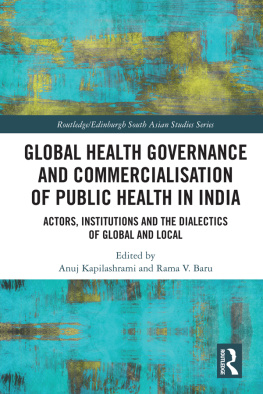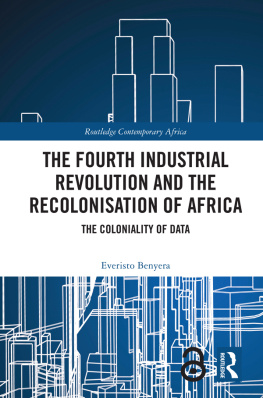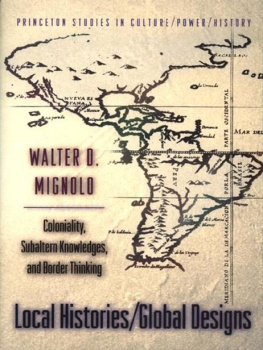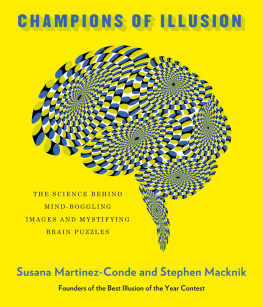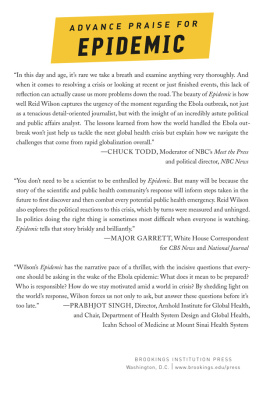Eugene T Richardson - Epidemic Illusions: On the Coloniality of Global Public Health
Here you can read online Eugene T Richardson - Epidemic Illusions: On the Coloniality of Global Public Health full text of the book (entire story) in english for free. Download pdf and epub, get meaning, cover and reviews about this ebook. year: 2020, publisher: MIT Press, genre: Romance novel. Description of the work, (preface) as well as reviews are available. Best literature library LitArk.com created for fans of good reading and offers a wide selection of genres:
Romance novel
Science fiction
Adventure
Detective
Science
History
Home and family
Prose
Art
Politics
Computer
Non-fiction
Religion
Business
Children
Humor
Choose a favorite category and find really read worthwhile books. Enjoy immersion in the world of imagination, feel the emotions of the characters or learn something new for yourself, make an fascinating discovery.

- Book:Epidemic Illusions: On the Coloniality of Global Public Health
- Author:
- Publisher:MIT Press
- Genre:
- Year:2020
- Rating:3 / 5
- Favourites:Add to favourites
- Your mark:
- 60
- 1
- 2
- 3
- 4
- 5
Epidemic Illusions: On the Coloniality of Global Public Health: summary, description and annotation
We offer to read an annotation, description, summary or preface (depends on what the author of the book "Epidemic Illusions: On the Coloniality of Global Public Health" wrote himself). If you haven't found the necessary information about the book — write in the comments, we will try to find it.
Epidemic Illusions: On the Coloniality of Global Public Health — read online for free the complete book (whole text) full work
Below is the text of the book, divided by pages. System saving the place of the last page read, allows you to conveniently read the book "Epidemic Illusions: On the Coloniality of Global Public Health" online for free, without having to search again every time where you left off. Put a bookmark, and you can go to the page where you finished reading at any time.
Font size:
Interval:
Bookmark:
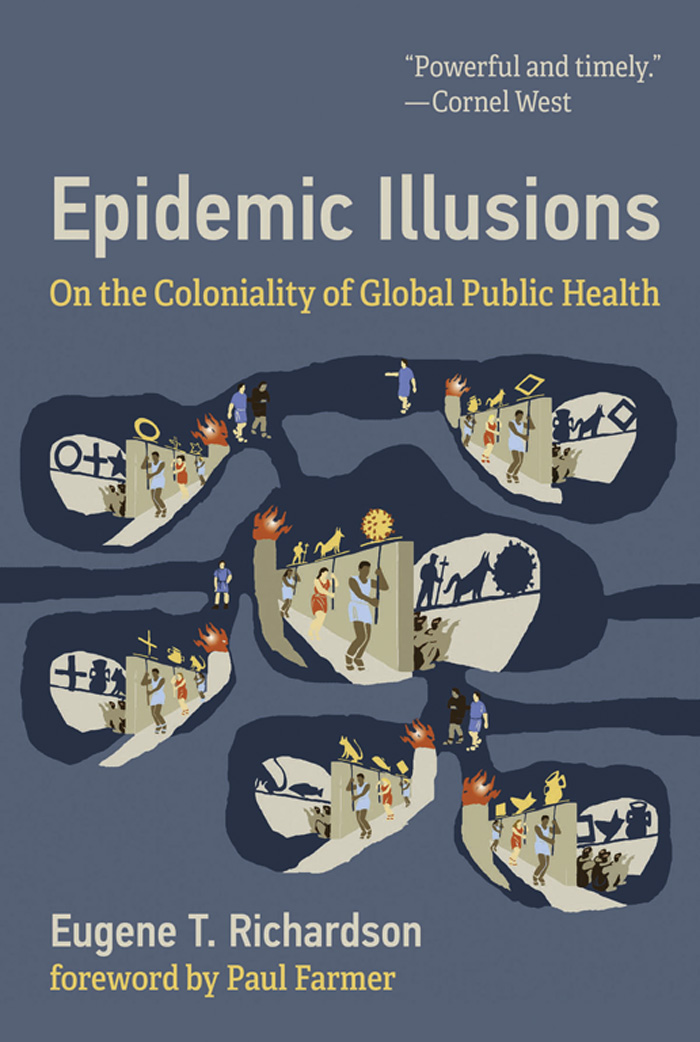
The game is up for global public health. Richardson delivers a withering critique of a discipline that has too long systematically ignored the real structural and political drivers of disease. If our analysis doesnt account for class, race, and colonial power, then weve missed the point. Fresh, creative, and even tricksteresquedont miss this book.
Jason Hickel, University of London; author of The Divide: Global Inequality from Conquest to Free Markets
Far too many of our efforts to achieve equity in health outcomes for everyone everywhere are underpinned by dangerous but unexamined assumptions and premises. Eugene Richardson shows us how to recognize them, take them apart, one by one, and commit them to the dustbin of coloniality where they belong. This book is set to become a prime text for our efforts to decolonize global health.
Seye Abimbola, University of Sydney; and Editor in Chief, BMJ Global Health
An impressive deconstruction of global healths colonial roots. This fine book is as sophisticated in social theory and history as it is in infectious diseases and medicine. The author doesnt just talk the talk of anthropology, public health, and clinical medicine; he walks the walk, and is as much at home as an ethnographer in West African Ebola settings as in the seminar room discussing postmodern theory, African history, and the imperial background of global health institutions. A telling contribution!
Arthur Kleinman, author of The Soul of Care
Eugene T. Richardson
Foreword by Paul Farmer
The MIT Press
Cambridge, Massachusetts
London, England
2020 Massachusetts Institute of Technology
All rights reserved. No part of this book may be reproduced in any form by any electronic or mechanical means (including photocopying, recording, or information storage and retrieval) without permission in writing from the publisher.
This book was set in ITC Stone Serif Std and ITC Stone Sans Std by New Best-set Typesetters Ltd.
Library of Congress Cataloging-in-Publication Data
Names: Richardson, Eugene T., author.
Title: Epidemic illusions : on the coloniality of global public health / Eugene T. Richardson ; foreword by Paul Farmer.
Description: Cambridge, Massachusetts : The MIT Press, [2020] | Includes bibliographical references and index.
Identifiers: LCCN 2020011240 | ISBN 9780262045605 (paperback)
Subjects: MESH: Epidemics | Global Health | Colonialism | Anthropology | Africa
Classification: LCC RA651 | NLM WA 105 | DDC 614.4dc23
LC record available at https://lccn.loc.gov/2020011240
10 9 8 7 6 5 4 3 2 1
d_r0
To my parents
One of the great challenges of any social movement is to develop new vocabularies.
Angela Y. Davis, Marcuses Legacies
Of a raft of new publications about Ebola, Epidemic Illusions is the most important Ive read to date. Thats because Eugene Richardson is asking the key questions of the day: What do racism and diverse forms of belittlement and exclusion have to do with epidemics? How do we best understand their progress and unequal toll? How are these virulent outlooks built into public health and academic discourses?
These questions arent new ones. Theyve been around for centuries and more, but are being asked, here, by a physician-anthropologist at a time when many without such specialized training are posing them vehemently. Richardsons book appears as the world is coveredunevenly, as ever with pandemicsby a new disease, and by an awakening to the perils of an old pathology, his nations oldest one: racism has enjoyed a long run in the United States, where neither public health nor epidemiology, argues Richardson, recognize their collusion in reproducing it. But this is a global pathology, as is the coloniality he dissects. These problems persist both here and there, with there meaning (in this book) the former colonies. Which is to say, the Majority World.
For years, Ive argued that the discipline of global health equity represents a sharp break with colonial medicine. But I find Richardson presents a more compelling, if less materialist, argument. He doesnt mince words in arguing that, as an apparatus of coloniality, Public Health manages (as a profession) and maintains (as an academic discipline) global health inequity. There are several grammatical and formatting qualifiers throughout the book, including capital letters and italics, but these seem to be references, and there are many, to a previous centurys logics and styles. He proposes novel connections, if novelty is defined as an application of old ideas and insights to new epidemics: drawing on Mikhail Bakhtin, for example, Richardson proposes a sort of textual carnivalization in order to unsettle webs of meaning and power in global health. This, without question, he has done.
Carnivalization works its way into most pages of this book, even its most somber ones. Richardsons prose is often carnivalesque, but he wastes no time getting serious business out of the way. He acknowledges white privilegeYou are a colonizer through and through. You can feel it in your bones, which have never known stunting. It courses through your veins, through which malaria never has. Every fiber of your being has been nurtured by centuries of predatory accumulationeven as he sends up his own training in anthropology, which he turns on the strange culture of experts in public health and epidemiology. At the World Health Organization, for example, Richardson the anthropologist was able to establish sufficient rapport to examine their relics and join their rituals.
Is this a joke? An inside joke? A philosophical exercise divorced, as so many of them are, from the real-world challenges of countering epidemic disease? Its not a joke. (When thousands of people start bleeding out of their mouths and eyes, as Richardson quotes in introducing Ebola as a theme, sometimes its best to take a step back and see where its all going.) With rare exceptions, global health inequalityand the noxious ideologies that have been the blueprint for ithave marred most colonial and postcolonial efforts to address epidemic disease. In a time when more and more people make the connection between pandemics and social inequality, with structural racism front and center, our flawed analyses of outbreaks are too often a form of status quo propaganda, and a mediocre one at that. For those outside of these circles and facing a heightened threat from such epidemics, its not funny at all.
If the text of Epidemic Illusions is sometimes marked by japery, its more marked by subtlety. Can one operate as an effective critic of modernity while using its terms of reference? Borrowing from Edward Said, Richardson approaches global public health as a form Orientalismin short, aiming to exhibit the discipline of epidemiology as a discursive space amenable to cultural criticism. Some of its practitioners, he writes, have had their moral outlooks stunted by coloniality. In these pages, a long riff about an arcane Ebola debate is often followed by devastating empirical insight about how such discourse is reflected in the stunted analyses in much research, writing, and sundry official commentary.
It can be a most trenchant critique. Why, Richardson asks, is there so much attention to stigma, often parsed as a local and cultural response to noxious events, but insufficient attention to structural racism? Why is he able to find, logging on to PubMed, over 5,000 articles about AIDS and stigma, while there are only 200 or so about HIV and racism? Is it because the term stigma is often used, in practice and sometimes in theory, to stunt our understanding of the forces promoting suffering among the afflicted, diverting our attention to their alleged cultural or cognitive deficiencies, whereas exploring racism, especially structural racism, turns our attention instead to powerparticularly the power of extractive colonial rule and white supremacy, and the varied regimes of coloniality they spawned?
Next pageFont size:
Interval:
Bookmark:
Similar books «Epidemic Illusions: On the Coloniality of Global Public Health»
Look at similar books to Epidemic Illusions: On the Coloniality of Global Public Health. We have selected literature similar in name and meaning in the hope of providing readers with more options to find new, interesting, not yet read works.
Discussion, reviews of the book Epidemic Illusions: On the Coloniality of Global Public Health and just readers' own opinions. Leave your comments, write what you think about the work, its meaning or the main characters. Specify what exactly you liked and what you didn't like, and why you think so.

